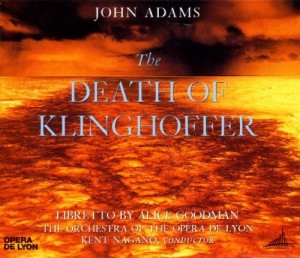John Adams, “The Death of Klinghoffer”
By admin_mike In
John Adams, The Death of Klinghoffer, released 1992 by Elektra Nonesuch Records
Alice Goodman, librettist
The Death of Klinghoffer (1991), performed by The Orchestra of the Opera de Lyon; Kent Nagano, conductor
Chorus of Exiled Palestinians
Chorus of Exiled Jews
Act I, Scene 1
Ocean Chorus
Act I, Scene 2
Night Chorus
Hagar Chorus
Act II, Scene 1
Desert Chorus
Act II, Scene 2
Day Chorus
Act II, Scene 3
The Death of Klinghoffer is Adams’s second opera both in general and about contemporary events (his first was Nixon in China). It centers on the 1985 hijacking of the cruise liner Achille Lauro by four members of the Palestine Liberation Front, during which American tourist Leon Klinghoffer was shot and thrown overboard. As I noted in review #7, Adams claims that it represents a serious change in his choice of harmonic language and structural and formal devices.
This is a big work, and in this medium I can really only barely touch on it; a detailed discussion of any one aspect would be a chapter in a book.
Alice Goodman’s libretto presents the PLF terrorists as villians but as humans, condemning their actions while still making (most of) them more than heartless killing machines. Much of the story is told in speeches, crew members’ and passengers’ remembrances what took place and their reactions to it. What interaction between characters there is is intimate and personal; it’s more about arguments between people than a reenactment of events, and even those are soliloquy-zed (which is fine). Some moments that I think stand out:
Mamoud (to the Captain): The day that I and my enemy sit peacefully, each putting his case and working towards peace; that day our hope dies and I shall die too.
***
Klinghoffer (to the assembled Terrorists): You don’t give a shit, excuse me, about your grandfather’s hut, his sheep and his goat, and the land he wore out. You just want to see people die.
But while I think the text is excellent, the music to which it is set is not so, though I find Marilyn Klinghoffer’s aria about the loss of her husband — which ends the opera — incredibly moving. That’s probably much more a personal thing — for the most part, I don’t like how classical music treats solo voice[1]. Most of the singing in Klinghoffer is in recitative, and in a highly shifting — sometimes bordering on atonal — harmonic environment, it begins to sound more like random noodling than melody. And in general, I think that the highly declamatory nature of spoken English makes it an inppropriate language for how soloistic modern music tries to treat it; the decorative, melismatic swooping developed when composers were setting French, Italian, and German that still informs contemporary composers is simply not idiomatic to English. Adams keeps to that misguided tradition.
The real gems of the opera are the choruses which separate each scene. Each is beautiful and powerful, with texts that offer commentary and background on the centuries of tension in the Middle East. The climax of the opening chorus is a real attention-grabber, featuring the repeated line, “Israel, laid all to waste,” in a way that’s somehow both terrifying and pathetic — though that may just be my own take on the relentless antagonism that has indelibly poisoned that region of the world. [2]
To sum up, I have tremendous respect for The Death of Klinghoffer, even if, outside the choruses, I don’t really enjoy the music. I think it’s worth experiencing for Alice’s Goodman’s amazing libretto, though Adams’s music doesn’t measure up to it; and I think it’s an incredibly daring and important thing to dramatize current and controversial events in a medium that has mostly ossified.
___
(1) My fiancee made the amazing assertion — with which I fully agree — that popular musics tend to do a much better job of featuring the solo voice than the classical idiom.
(2) I believe that the choruses are available separately as Choruses from Klinghoffer, which I would definitely recommend.


No Comment
Sorry, the comment form is closed at this time.